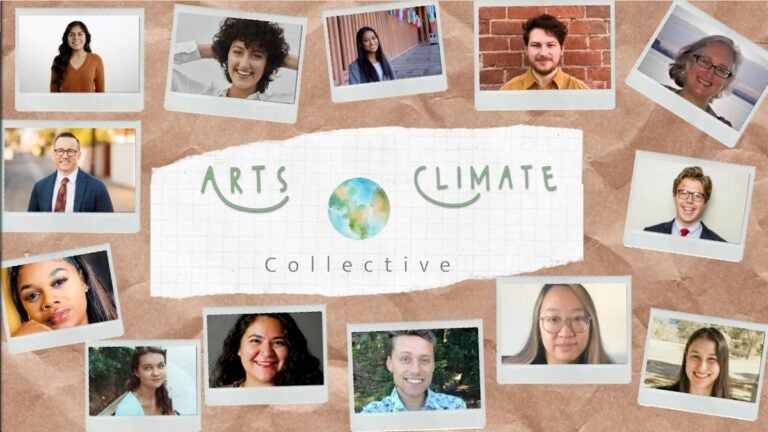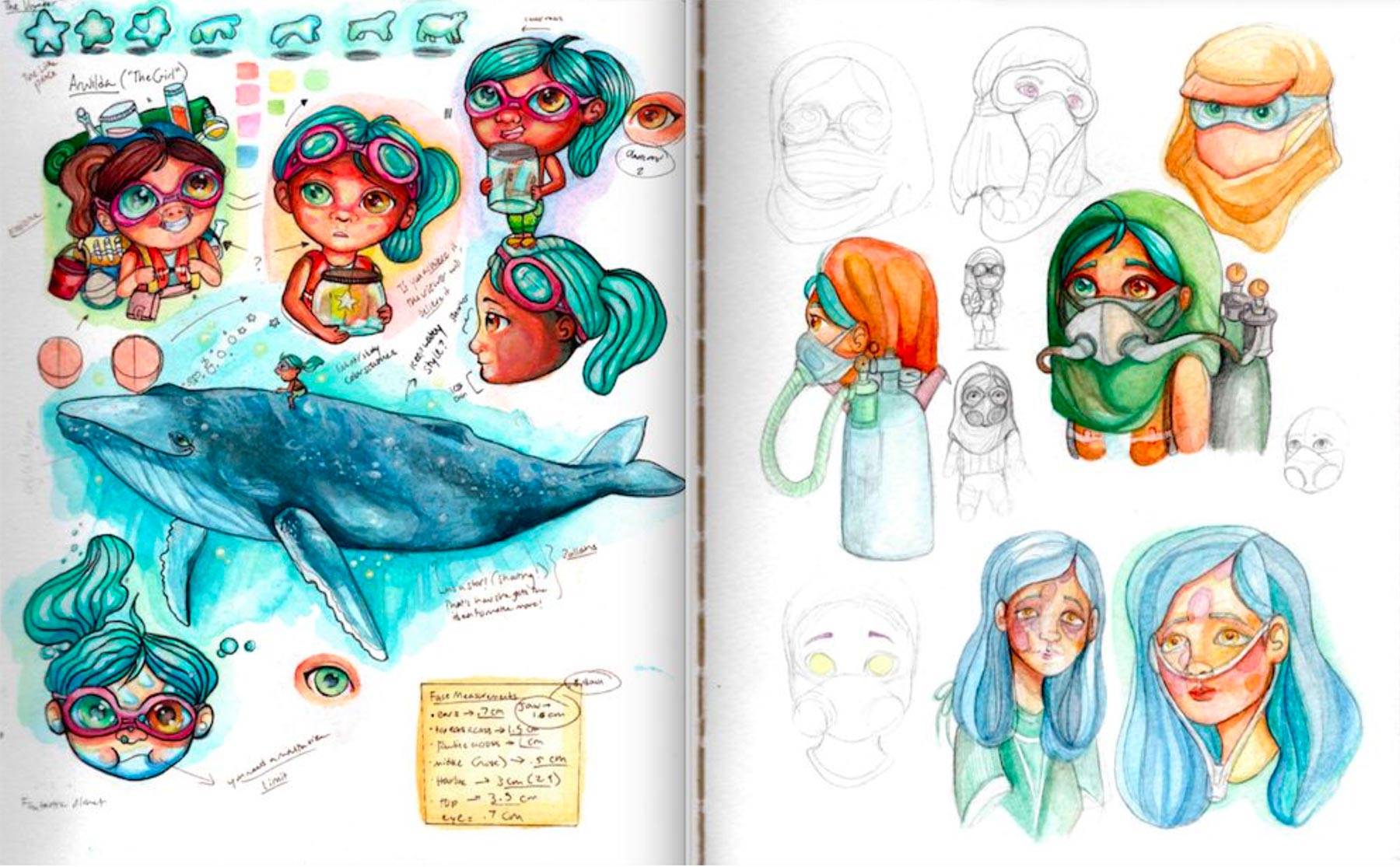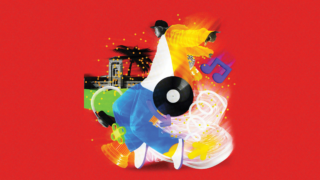
Arts become a tool for climate action in the hands of USC students
The first round of 12 Trojan grant winners will pursue storytelling projects on sustainability and environmental justice through the Arts and Climate Collective.
USC students now have a new way to use the arts to push for environmental justice and fight climate change. As part of the university’s Earth Day celebrations, the university’s Arts and Climate Collective on Thursday announced the recipients of its first awards.
Through the pilot program, undergraduate and graduate students from across USC apply to fund projects that connect arts, culture and storytelling with sustainability and environmental justice issues. Students will support each other in small clusters over the summer and have the option of connecting with faculty experts in their areas of interest to complete their projects.
Twelve students learned that they were selected to win one-time awards of up to $1,000. Their project topics range from animated films about rising sea levels to podcasts about climate change, air pollution and homelessness.
“The goal is, fundamentally, to empower students and uplift what they are doing,” said Hannah Findling, a graduate student at the USC Price School of Public Policy and one of three co-founders of the Arts and Climate Collective. “Issues like sustainability, climate change and environmental justice are all issues we’re in together and require collaboration across all of these sectors.”
Funding for the new program came from the USC Office of Sustainability and Arts in Action, through the USC Office of the Provost.
Arts and Climate Collective aims to translate scientific research for a broad audience
The idea for the Arts and Climate Collective stemmed from the Engagement Committee of the USC Presidential Working Group on Sustainability. The working group is made up of faculty, students and staff. They recommend changes to lessen the university’s environmental impact and help create a comprehensive universitywide approach to sustainability.
As the working group’s members listened to the USC community discuss their environmental concerns over the past year, they learned about the important role that the arts play in making scientific research accessible to a wide audience. They also discovered a large community of talented students who were passionate about environmental issues.
The collective brings these students together and helps them pursue projects with an environmental message, explained William Warrener, lead producer for Arts in Action and another co-founder of the Arts and Climate Collective.
There are endless possibilities based on the deep well of talent and tremendous passion at USC.
Colin Miles Maclay
Findling, Warrener and the third co-founder, faculty member Colin Miles Maclay, began working on the collective in March. Within weeks, they secured funding, procured proposals from students, reviewed applicants and got faculty and staff on board.
Despite this short turnaround time, the collective received nearly 30 applications. The proposals included documentary films, animated shorts, podcast series, musical performances and apps.
“There are endless possibilities based on the deep well of talent and tremendous passion at USC,” said Maclay, research professor of communication and executive director of the Annenberg Innovation Lab. “We’ve landed on something with a lot of potential and couldn’t be more excited about what it means for all members of the university community, now and over time.”
Funding applications came from undergraduate, graduate and doctoral students in six different schools: the USC Dornsife College of Letters, Arts and Sciences, the USC Viterbi School of Engineering, the USC School of Cinematic Arts, the USC Roski School of Art and Design, the USC Thornton School of Music and USC Price.
Through podcasts or animated shorts, USC students tell climate change stories
One of the selected projects is a podcast series centered around environmental, social and racial justice from Irene Franco Rubio, a sociology student at USC Dornsife who is living in Arizona.
Her podcast will provide a platform for narratives of Black, Indigenous and all people of color in that state.
Without storytelling, you can have a lot of the data you need but you are not going to move hearts and minds.
William Warrener
“The goal of this podcast is to create a digital space for historically underrepresented stories and voices to be heard,” she said. “In order to create the change our diverse communities need, we need the space to talk about the issues we face in an uplifting and inclusive environment, with young people of color recognizing the power of their voices to lead the conversation.”
Franco Rubio has experience uplifting people in her home state. She has worked with community transformation groups Arizona Coalition for Change and Our Voice Our Vote Arizona. She wants the podcast to serve as a way for young people from marginalized communities to become more engaged and empowered by learning how to be more civically engaged.
Another project comes from Gwenan Walker, a sophomore studying human biology at USC Dornsife who is pursuing a minor in animation at the USC School of Cinematic Arts. She is working on a short animated film about the impacts of climate change. The film takes place 100 years in the future and explores the troubling effects of climate change on marine ecosystems. It addresses melting glaciers, rising sea levels, ocean acidification and shifting flood zones.

Walker thought of this project over a year ago during the summer after high school graduation. But she had been too busy to tackle it. Being part of the Art and Climate Collective — and the support that comes with it — will give her a chance to get it done.
As someone who is studying STEM and arts, Walker said she looks forward to working with faculty to make the film as accurate as possible. She understands the special relationship between art and science.
“I feel like when you’re talking about issues like climate change, art is so important because it makes it accessible,” she said.
Warrener, one of the co-founders, agreed. “Without storytelling, you can have a lot of the data you need but you are not going to move hearts and minds,” he said.
As society begins to reopen from the pandemic, he added, we must have important conversations about our environmental future. Programs like the Arts and Climate Collective can keep the environment in the public eye, and the changes in lifestyle caused by COVID-19 may encourage more openness to societal change.
“It’s more vital than ever that we don’t forget about this,” he said. “I think this pandemic has shown us the extraordinary ways that we can adapt.”



